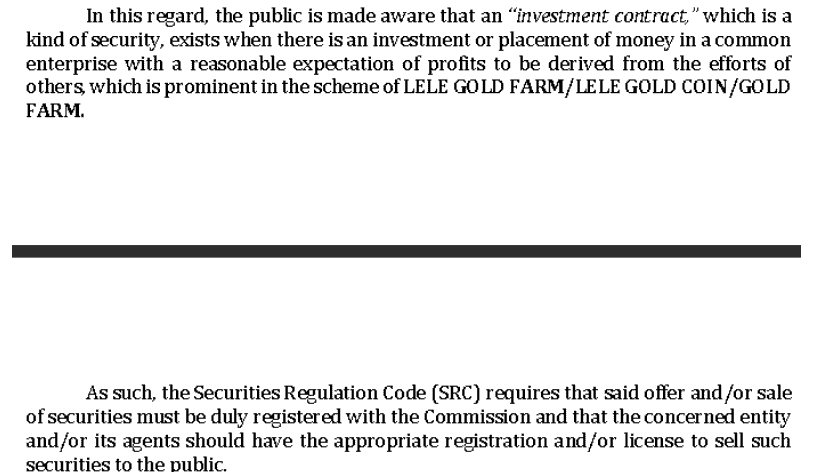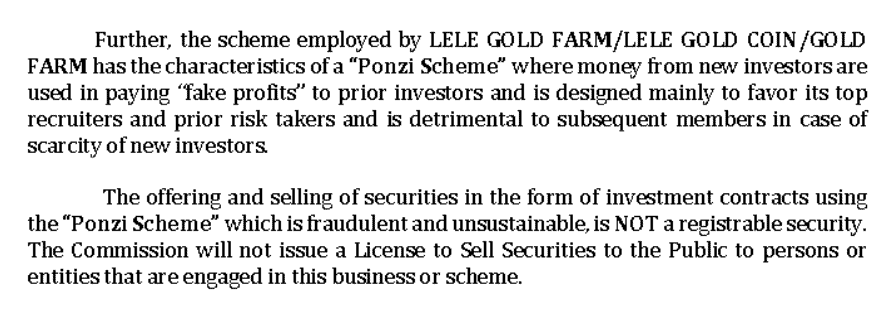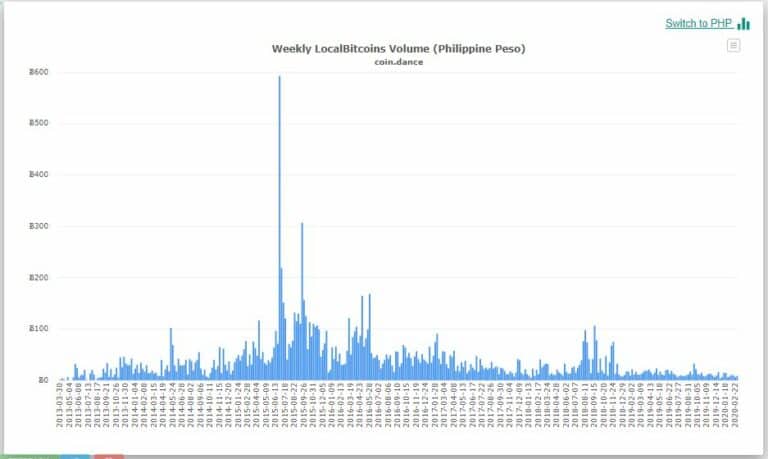SEC Warns Public Against Scammers Posing as Registered Entities
The SEC is advising the public to be careful when giving their money to any entities, advises them to check their SEC registrations first.

Subscribe to our newsletter!
- The SEC is warning the public about people pretending to work for financial companies and trying to steal their money.
- The Commission advises people to make sure they know who they are giving their money to by checking if the company is registered with the SEC.
- The SEC says some companies might be doing a Ponzi scheme, where they use new investors’ money to pay off older investors, but the company has no real product or service. This can lead to the company failing and the investors losing their money.
There has been a rise of reports regarding entities that pose as legitimate and reputable financial institutions scamming the investing public of their hard-earned money. The public is advised to protect themselves from obvious investment scams by making sure that he or she has done enough research and has equipped themselves with enough information about the entity and their business. Always check prior registration with the Securities and Exchange Commission. – Securities and Exchange Commission
This is the public advisory of the Securities and Exchange Commission (SEC) after receiving reports that there are certain individuals who claim to be agents, representatives, and even executives of registered entities offering financial services and products.
As defined by the Commission, ‘financing companies‘ are corporations, except banks, investments houses, savings and loan associations, insurance companies, cooperatives, and other financial institutions organized or operating under other special laws, whichare primarily organized for the purpose of extending credit facilities to consumers and to industrial, commercial, or agricultural enterprises, by direct lending or by discounting or factoring commercial papers or accounts receivable, or by buying and selling contracts, leases, chattel mortgages, or other evidence of indebtedness, or by financial leasing of movable as well as immovable property.
However, the most common entities that the regulatory agency has been flagging are those that offer securities in the form of an investment contract. This is because entities selling securities in the form of an investment contract require appropriate registration from the SEC in accordance with the Securities Regulation Code, and agents and representatives are also required to have related permits.
In fact, the SEC has already issued 13 public advisories against unregistered entities for January 2023 alone, more than December 2022’s 10 and November 2022’s eight. The Commission’s reminder is always present in every public advisory it issues.

“Remember, a corporation or any business entity MUST SECURE PRIOR REGISTRATION AND ACQUIRE A SECONDARY LICENSE TO SOLICIT INVESTMENTS before engaging in any investment-taking activities. The mere fact that an entity has no secondary license granted by the SEC make their investment-taking activities, ILLEGAL,” the SEC added.
Meanwhile, the Commission also mentioned that there are still entities employing the Ponzi scheme, which uses the money invested by the new investors to pay the fake profits of the older investors.

“Put simply, a Ponzi scheme involves paying existing investors in a virtually nonexistent enterprise or business with the funds collected from new investors. Meaning, the money given as a perceived profit to existing investors is actually taken from the money invested by new investors. This business model is unsustainable and is bound to crash when they run out of new investors; the business has no other way of producing money because they do not offer any real product or service in exchange for money,” the regulatory agency explained.
The SEC even emphasized that even if an entity or project has been existing for a long time, as long as it has no product or service in exchange for the profits that it gives to the investors, it will still be a Ponzi scheme. It is after some agents and promoters, including celebrities and social media personalities, of entities that have illegal investment-taking schemes are always using this card.
During the debacle of the infamous Lele Gold Farm, the Commission, in an email response to BitPinas, insisted that, though there is no direct advisory against streamers, content creators, and social media personalities allegedly involved in the promotion of an unregistered project, these influencers can still be held liable when proven.
“When the business employs a Ponzi scheme, the public’s investment is never safe because the business can fail and collapse any given time as soon as they are not able to invite new investors to fund the promised profits to existing investors. Worse, some entities even run away with the hard-earned money of investors even before the business crashes, leaving both existing investors and newly invited investors high and dry because their money got taken away,” the regulatory agency highlighted.
In a draft version of the implementing rules and regulations (IRR) of the Financial Products and Services Consumer Protection Act (Republic Act 11765), the SEC defined investment fraud as any form of deceptive solicitation of investments from the public, which includes Ponzi schemes and other schemes involving the promise or offer of profits or returns that are sourced from the investments or contributions made by the investors themselves.
The regulatory agency also issued in the draft that lawbreakers, including the individuals (salesmen, brokers, dealers or agents, representatives, promoters, recruiters, uplines, influencers, endorsers, abetters, and enablers) of a Ponzi entity, are punishable by up to five years of imprisonment, a fine of ₱50,000 to ₱2 million, or both. They can also be fined of ₱50,000 to ₱10 million for each instance of investment fraud and not more than a ₱10,000 fine for each day of continuing violation.
The above-mentioned fines are different from those under the SRC, which are a maximum fine of ₱5 million, 21 years of imprisonment, or both.
“Protect your money, always equip yourselves with the proper information and knowledge before investing, and do not hesitate to check with the Securities and Exchange Commission,” the SEC concluded.
This article is published on BitPinas: SEC Warns Public Against Scammers Posing as Registered Entities
Disclaimer: BitPinas articles and its external content are not financial advice. The team serves to deliver independent, unbiased news to provide information for Philippine-crypto and beyond.





